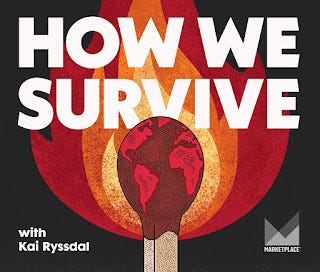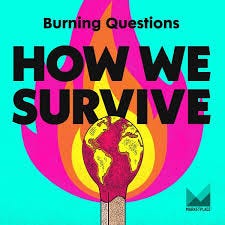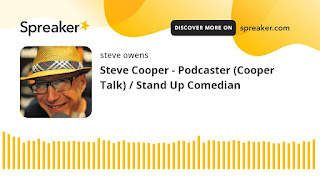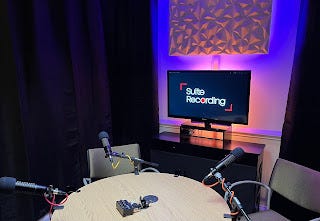How We Survive Podcast: Focusing on Solutions To Climate Change
PLUS...A local Business Roundtable Podcast hosted by South Jersey podcasting legend Steve Cooper
In the trailer for the How We Survive podcast, host (in September 2021) Molly Wood announces, "This is not a podcast about the end of the world. It is a podcast about solutions. It's about innovating our way into a better future."
The show doesn't spend precious time trying to convince climate deniers. It plays a clip of a man who says that climate change is not a thing, and when asked why he thinks that, he replies tersely, "Because."
Instead, the podcast announces, "The climate crisis is here. The Western United States is burning; much of the Northeast is underwater after a hurricane; massive floods sweep away towns in Europe. Time is slipping away to stop the worst effects of a warming planet, and the world is looking for solutions."
The show's marketing pitch is: "How We Survive explores the technology that could provide some of those solutions, the business of acclimatizing to an increasingly inhospitable planet, and the way people have to change if we’re going to make it in an altered world."
In its first season, How We Survive investigated the rush to mine lithium in the U.S. The need for lithium for batteries is driving a modern gold rush for the metal that could help save the world, but it relies on an old, dirty technology: mining.
And just like the gold rush of the 1800s, the rush for “white gold,” as it’s known, involves a lot of human conflict and drama: radical environmentalists who hope to destroy industrial civilization, business rivalries so fierce that one CEO was dragged off a plane and Indigenous people who say they’ll sacrifice their lives to stop a mine from being built.
The second season, hosted by Amy Scott, dealt with rising sea levels how they are already affecting Miami right now, and what could happen to the city in the future. HINT: How long can you tread water?
The show recently began its sixth season with Marketplace host Kai Rysdall, a Navy veteran, traveling from the Arctic to a Pacific Island to understand how the U.S. military could affect our climate future.
In a miniseries called Burning Questions (seasons 3 &5), the podcast asks questions we may have to answer about our future, such as: Where Should I Live?
If you care about your real estate values, listen to this episode. You don't want to own a home in an area where the average temperature is over 120 degrees for months at a time. That heat tends to cool home prices.
One of the most illuminating episodes was the November 8, 2023 show Groundwater Wars, in which the small farming town of Kingman, Arizona, deals with the scarce resource of groundwater. The show offers an unsparing view of how farmers, ranchers, homeowners, and government officials battle over a swindling resource—fresh water.
How We Survive was created and produced by Marketplace, which has been podcasting since 2005. Marketplace's mother ship -- American Public Media -- has a long history of producing documentary and investigative journalism shows.
Check out How We Survive. There are plenty of climate change podcasts out there. An overwhelming majority are ear-worthy. A few tend to lecture listeners and get hung up on climate deniers instead of focusing on solutions like How We Survive.
****************************************************************************************
The Coop Tank: A Business Roundtable Podcast That Is An Industry Model
Podcasting is well-known for its low barrier to entry. In essence, that attribute has been a hallmark of this industry since its inception about 20 years ago.
Therefore, podcasting can accomplish what other media formats cannot -- narrowcast to a small, local audience with a shared passion.
Indie podcasters are the catalysts of this narrowcasting. One of the many societal benefits of indie podcasting is its unique ability to narrowcast to a small geographic area.
That's the case with this local South Jersey business podcast called The Coop Tank. This show facilitates a discussion among local South Jersey business owners instead of entertainers and finds out why they do what they do and how they got there. It's a roundtable discussion that could tie up any podcast host into knots, but the host, Steve Cooper, handles this talkfest with expertise and care.
For example, a recent episode included insightful and lighthearted conversation with Heather Kay (Ready Aim Impact), Carrie Nelson (Carrie Nelson Photography), and Frankie Patterson (Cherry Hill Neighbors) about the business world, the networking world, and life.
The Coop Tank just released its 66th episode and has been a key resource for local business people.
The podcast is the brainchild of Steve Cooper , who began life as a local South Jersey guy. He graduated from South Jersey's Stockton College (now University) in 1986. From that point until now, Steve Cooper is one of those rare people who can succeed at anything he attempts. And "Coop" has tried a lot of careers. After college, he sold fax machines, then was a successful stand-up comedian in New Jersey and in Los Angeles.
Steve was also a hand model, worked in Corporate Restaurant Marketing, wrote screenplays, started a comedy corner, and created and sustained two successful podcasts. Steve was -- and is -- a large presence in Internet radio.
Steve transforms The Coop Tank from a stiff, buttoned-down business podcast into a lively, entertaining show with guests sharing business stories but personal stories of success, failure, and challenges.
How does Steve do that?
First, Steve's career as a successful stand-up comedian demonstrates his quick wit, sharp mind, and an eye for the absurd in life. These are essential traits for a successful podcast host.
Second, Steve's career stints in sales and marketing make him the ideal podcaster to create visibility and a brand for The Coop Tank. Talking to Steve, I realized that he could sell wood to a forest, religion to The Pope, or a cage to a lion.
Third, Steve is one of those people who can talk to anybody. He's done that successfully with more than 1 000 episodes of Cooper Talk, his highly successful interview podcast.
Interviewing three local business people has a high degree of difficulty for any podcast host, however, Steve can turn the mundane into the meaningful. In the October 24, episode, Steve asked Rob Wells of Burlington County Bridge Commission if he grew up wanting to be a county bridge commissioner. Wells chuckled, answered no and proceeded to map his life from college to the present with wit and humor.
Steve Cooper records The Coop Tank in Suite Recording in Mount Laurel, New Jersey.Suite Recording hosts numerous local podcasts, from insurance services to Remember When?, a superb podcast hosted by Jose Colon-Cruz where he and his two co-hosts add their flare to your favorite memories of nostalgia, such as Nintendo DS, SpongeBob, Veggie Tales, and Goosebumps.
On The Coop Tank, Joe Gangemi is the sound engineer and second voice on The Coop Tank. Before Steve introduces his three guests, he chats with Joe about topics as diverse as disco fries to dancing skills.
Joe Gangemi observes: "Steve is the go-to guy about podcasting around here."
"Steve has been a mentor for other podcasters in the South Jersey area," Joe says. "Steve Cooper's life expertise has perfectly prepared him to host a podcast."
When asked about his podcast hosting skills on The Coop Tank, Steve answers modestly, "Some podcasters worry more about the equipment than the content. I concentrate on my guests."
That concentration is evident on a local business roundtable podcast like The Coop Tank, where Steve Cooper sparks dynamic discussions of lives, careers, and aspirations with three business people he just met.
If you're an indie podcaster and can benefit from improved interviewing skills, listen to The Coop Tank. If you're a business person and want to understand how to present yourself so that people don't fall asleep mid-sentence, listen to The Coop Tank. If you're a podcast fan and want to hear a master interviewer transform three local business people into superb storytellers, listen to The Coop Tank.









